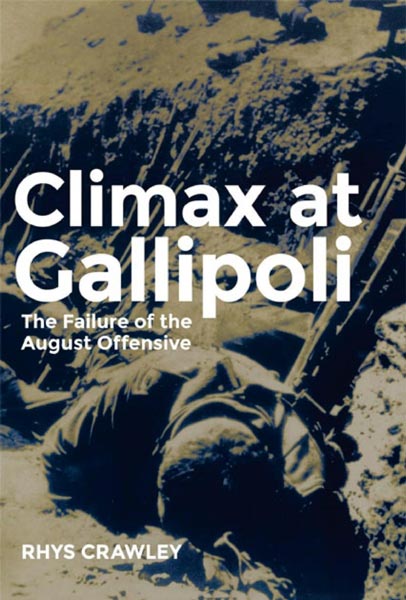 Climax at Gallipoli Climax at Gallipoli
The Failure of the August Offensive
Rhys Crawley
Narrated by Fred Humberstone
Available from Audible
Book published by University of Oklahoma Press
Shows how Allied operations against the Ottomans were doomed to fail in 1915.
Gallipoli: the mere name summons the story of this well-known campaign of the First World War. And the story of Gallipoli, where in August 1915 the Allied forces made their last valiant effort against the Turks, is one of infamous might-have-beens. If only the Allies had held out a little longer, pushed a little harder, had better luck—Gallipoli might have been the decisive triumph that knocked the Ottoman Empire out of the First World War. But the story is just that, author Rhys Crawley tells us: a story. Not only was the outcome at Gallipoli not close, but the operation was flawed from the start, and an inevitable failure.
A painstaking effort to set the historical record straight, Climax at Gallipoli examines the performance of the Allies’ Mediterranean Expeditionary Force from the beginning of the Gallipoli Campaign to the bitter end. Crawley reminds us that in 1915, the second year of the war, the Allies were still trying to adapt to a new form of warfare, with static defense replacing the maneuver and offensive strategies of earlier British doctrine. In the attempt both the MEF at Gallipoli and the British Expeditionary Force on the Western Front aimed for too much—and both failed. To explain why, Crawley focuses on the operational level of war in the campaign, scrutinizing planning, command, mobility, fire support, interservice cooperation, and logistics. His work draws on unprecedented research into the files of military organizations across the United Kingdom and Australia.
The result is a view of the Gallipoli Campaign unique in its detail and scope, as well as in its conclusions—a book that looks past myth and distortion to the facts, and the truth, of what happened at this critical juncture in twentieth-century history.
Rhys Crawley is a historian with the Strategic and Defence Studies Centre at the Australian National University. He received his doctorate from the University of New South Wales at the Australian Defence Force Academy.
REVIEWS:
“Rhys Crawley takes a revisionist sledgehammer to one of the remaining myths of the Gallipoli campaign: that the Allies could have won the Suvla offensive of August 1915. In a series of carefully constructed chapters he demonstrates that the operation’s failure was a function of structure rather than circumstance. Not only was the plan too ambitious, but it placed far too much faith in the possibilities of maneuver in an age of industrialized positional warfare. The result was all too typical of the Great War—an aggregation of sacrifices as futile as they were heroic.”
—Dennis Showalter, author of Hitler‚Äôs Panzers: The Lightning Attacks that Revolutionized Warfare “Rhys Crawley’s rigorous examination of the August offensives at Gallipoli—in particular the artillery and logistic support required for a successful attack—deepens our understanding of why the First World War was so expensive in casualties, while the front lines seemed to move hardly at all. This book is highly recommended for all those interested in the Gallipoli campaign and in the operations of the First World War as a whole.”
—Robert O'Neill, author of The German Army and the Nazi Party, 1933‚Äì1939
|

